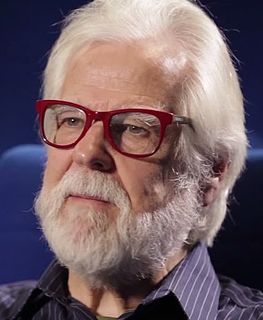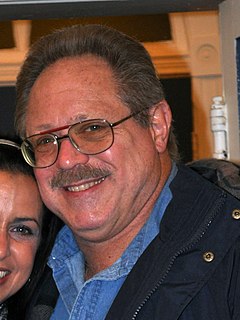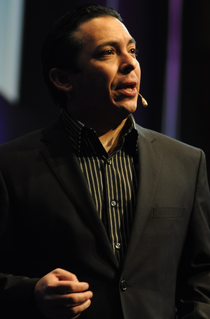A Quote by Jan Harlan
It is amazing that 2001: A Space Odyssey has not aged at all, except for a few minor technical gadgets. The main reason is, of course, the philosophical or spiritual element in this story. We know as little today about the secrets of Creation and evolution as we knew before, and it is not likely that we'll ever know much more. We'll have to be satisfied, as Kubrick was, respectfully admiring the potential for evolution within the mystery of the universe's creation.
Quote Topics
About
Admiring
Aged
Amazing
Before
Course
Creation
Creation And Evolution
Element
Ever
Evolution
Except
Few
Gadgets
Knew
Know
Kubrick
Likely
Little
Main
Minor
More
Much
Mystery
Odyssey
Philosophical
Potential
Reason
Respectfully
Satisfied
Secrets
Space
Space Odyssey
Spiritual
Story
Technical
Today
Universe
Within
Related Quotes
The story of 'Mirror Mirror' is in many ways a story about evolution. It's about the evolution of a child into an adult. It's about the evolution of those dwarves into something a little less rock-like, a little more humanoid. It's about the evolution of history, too, from the darkness of the Middle Ages into the light of the Age of Reason.
The story of Mirror Mirror is in many ways a story about evolution. Its about the evolution of a child into an adult. Its about the evolution of those dwarves into something a little less rock-like, a little more humanoid. Its about the evolution of history, too, from the darkness of the Middle Ages into the light of the Age of Reason.
When we read about Creation in Genesis, we run the risk of imagining God was a magician, with a magic wand able to do everything. But that is not so. God is not a demiurge [demigod] or a magician, but the Creator who gives being to all entities. Evolution in nature is not opposed to the notion of Creation, because evolution presupposes the creation of beings that evolve.
I believe in the theory of evolution, but I believe as well in the allegorical truth of creation theory. In other words, I believe that evolution, including the principle of natural selection, is one of the tools used by God to create mankind. Mankind is then a participant in the creation of the universe itself, so that we have a closed loop. I believe that there is a level on which science and religious metaphor are mutually compatible.
Evolution is evolution - and it's happened before us and will continue after we're gone. But, what's taking place now is much more than change for the sake of change. The socialization of content creation, consumption and participation, is hastening the metamorphosis that transforms everyday people into participants of a powerful and valuable media literate society.
I do believe in this evolution of consciousness as the only thing which we can embark on, or in fact, willy-nilly, are embarked on; and along with that will go the spiritual discoveries and, I feel, the inexhaustible wonder that one feels, that opens more and more the more you know. It's simply that this increasing knowledge constantly enlarges your kingdom and the capacity for admiring and loving the universe.
Evolution is one of the most powerful and important ideas ever developed in the history of science. Every question it raises leads to new answers, new discoveries, and new smarter questions. The science of evolution is as expansive as nature itself. It is also the most meaningful creation story that humans have ever found.
The meaning of the Sabbath is to celebrate time rather than space. Six days a week we live under the tyranny of things of space; on the Sabbath we try to become attuned to holiness in time. It is a day on which we are called upon to share in what is eternal in time, to turn from the results of creation to the mystery of creation; from the world of creation to the creation of the world.
You have to know everything. You have to know how to light a scene. You have to know all this technical stuff about directing. No, you don't. You can know as much or as little as you have to. Your main job is to get great performances and tell the story correctly and capture it correctly. Then it's just basically yours to complicate or simplify as much as you want.
There are an awful lot of scientists today who believe that before very long we shall have unraveled all the secrets of the universe. There will be no puzzles anymore. To me, it'd be really, really tragic because I think one of the most exciting things is this feeling of mystery, feeling of awe, the feeling of looking at a little live thing and being amazed by it and how it has emerged through these hundreds of years of evolution and there it is and it is perfect and why.
The genius is not in how much Stanley Kubrick does in “2001: A Space Odyssey,'' but in how little. This is the work of an artist so sublimely confident that he doesn't include a single shot simply to keep our attention. He reduces each scene to its essence, and leaves it on screen long enough for us to contemplate it, to inhabit it in our imaginations. Alone among science-fiction movies, “2001'' is not concerned with thrilling us, but with inspiring our awe.


































